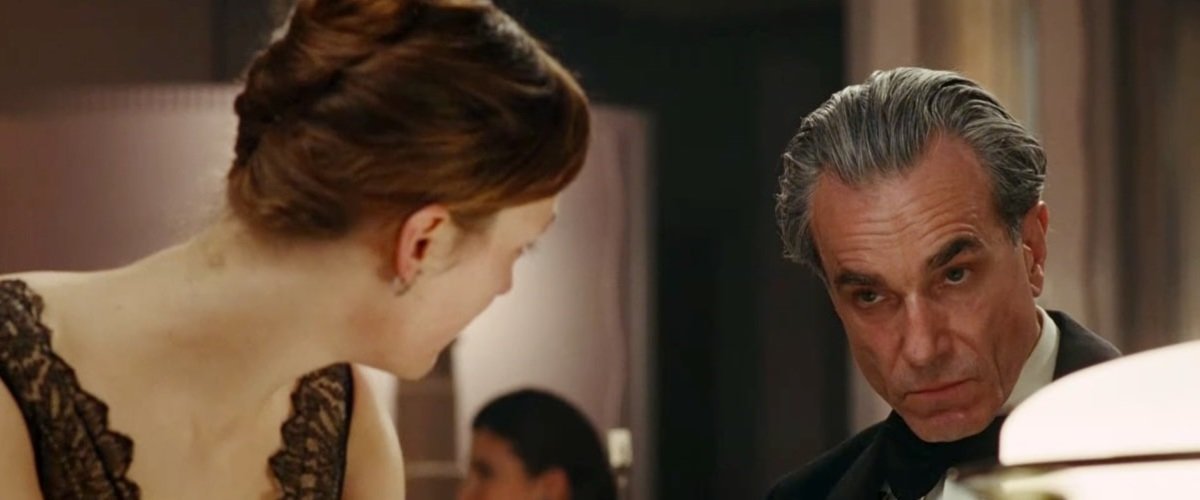Director: Paul Thomas Anderson
Date: 16 March 2018
jamesintexas rating: ***

Phantom Thread exists in a nebulous plane where I feel instantly unqualified to explore its meaning and themes because of my own inadequacy with understanding what it is saying. I saw it in the same theater and even the same seats that I saw The Master in several years ago, and I remember a similar feeling: this film is important and has something to say, but I am not sure that I get it. I have found myself swimming in PTA's films this decade-The Master, Inherent Vice, and now this-that have left me mesmerized, confused, and desirous of more viewings, more thinking, and more consideration.
Paul Thomas Anderson does not make boring movies, and Phantom Thread is compelling in its focus on 1950's London acclaimed dress designer Reynolds Woodcock (Daniel Day-Lewis in his final role), his sister Cyril (Lesley Manville) who manages The House of Woodcock, and the waitress-turned-ingenue Alma (Vicky Krieps) who upends both of their worlds. Anderson's camera glides in with the phalanx of women, climbing a vertigo-inducing staircase, who sew and imbue Reynolds's creations with life, and much of our time is spent in this insular world with its elegantly designed rooms and beautifully arrayed trays of scones, teas, eggs, and such. Woodcock prefers a kind of reverential silence and an artist's complete control over facets of his life that his sister is completely willing to provide. An opening scene reveals him stating, "I cannot start my day with a confrontation. I simply have no time for confrontations," and Cyril helping jettison his latest relationship. The plot of the film is nearly nonexistent, but instead, Phantom Thread becomes a contest of wills and an exploration of desire and need within a relationship as Alma proves to be the most formidable person Reynolds has in his life.
During a trip to the country, Reynolds encounters Alma, a waitress who catches his eye, and he, hers. The upending of routine is tantamount to an earthquake for the fastidious Reynolds. Jam scraping against toasted bread, the pouring of tea, and the movements of chairs even disrupt him. Cyril reveals to Alma how a discombobulated morning for Reynolds can obliterate the whole day, but for the most part, Anderson is content to show us Woodcock arranging and sewing fabric for the royalty and the upper classes, fevered into a near-frenzy at a 1950's fashion show where he applies the final touches to the women who wear The House of Woodcock and also views them through a spyglass emboldened in the wall of the studio. Alma defends his work, makes demands of him and his time and his fastidiousness, and the suggestion is that upfront clashing with him is what Reynolds needs and ultimately wants as a man who sees himself as cursed at times and sees the past living and breathing alongside him.
Anderson is saying something about the reciprocity of desire and fulfillment here, and he shoots hauntingly beautiful scenes of them walking outside, driving in a very cramped automobile with the sky lurking overhead, with them inside the carefully calibrated domains of the dressmaker's studio. Jonny Greenwood's score is impossibly gorgeous and luminous, echoing shades of his brilliant, masterful work in There Will Be Blood, leaning heavily on pianos and strange, discordant sounds. The entire production is one of beauty and meticulousness. Vicky Krieps is a strong challenge to Day-Lewis here, making their pairing a powerful one, and Manville, though she seems to disappear in the final third of the film, an iron presence of will and love for her brother. There is something profound and beautiful here, and I think I have faith in Anderson to accept that Phantom Thread is going to take much more time and thought (and probably subtitles) for me to learn more about what I think about it. Anderson makes us consider how love is both rapturous and poisonous, I think, and the importance of changing because as Reynolds puts it, "A house that doesn't change is a dead house."
And finally, a word about Daniel Day-Lewis, who can command the screen just putting on his purple socks or slowly eating an omelette. To see the man who embodied Christy Brown, Hawkeye, Gerry Conlon, Bill the Butcher, Daniel Plainview, and Abraham Lincoln round out his career in film as Reynolds Woodcock, this enigmatic, oblique, cruel, and, at times impenetrable man is a wonder. Woodcock's frustrations burst through in florid, painful remarks to those around him and the occasional wonderful round of cursing. The performance is a more physical and silent one of movements, looks, and gestures though, and his gaze is a haunting one, captured in many close-ups, often peering over frames of glasses or as he straightens out the fabric from a dress. Hearing him pontificate about the word "chic" is a highlight of the year, as well as his final Oscar clip.
I have been in awe of Daniel Day-Lewis since My Left Foot, but in the theater, probably since Last of the Mohicans. I saw that film at the York Theater in Elmhurst, The Boxer in Columbus, Ohio, Gangs of New York at the Edwards in Houston, There Will Be Blood at the Ritz East in Philadelphia, The Nine in downtown Chicago, Lincoln in Las Vegas, and I leave him now at the River Oaks Theater in Houston with Phantom Thread, constantly awed, grateful for his pairing with Paul Thomas Anderson, and appreciative of spending so much screen time with this marvelous actor.
